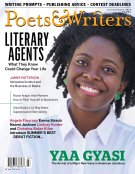You’ve interviewed many luminaries over the years—President Jimmy Carter, Molly Ringwald, James Ellroy, Elizabeth Gilbert, LeVar Burton, Chimamanda Ngozi Adichie, Nick Hornby, Alison Bechdel, Tavis Smiley, Anne Rice, Juan Felipe Herrera, and Marlon James, among others. Who will you be interviewing this year?
My time is really taken up with assigning and editing these days, but nevertheless I’ll be interviewing Colm Tóibín about James Baldwin tomorrow night on stage, and I’m supposed to talk on the phone with Don DeLillo about Zero K.
You launched the newspaper’s influential books blog, Jacket Copy, in 2008. How has the blog grown and changed over the years? Is there a tonal difference between Jacket Copy and the newspaper’s books section?
In 2008, I was brought on as a freelancer by then-book editor David L. Ulin to launch Jacket Copy, so I’ve been with it since it took its first shaky steps. One of my first posts was about One Story versus Ninth Letter, two fantastic but very different literary journals, and I can see us writing a similar post today. The biggest divergence between Jacket Copy and the book section happened in 2010, when David moved into the role of book critic and a new book editor was hired whose longest tenure at the paper had been as editor of our Obituaries section. His tastes ran more to the severe than the cheerful blogging I’d been used to, like the annotated, color-coded, 61 Essential Post-Modern Reads.
How important do you think social media is in your role as an editor and critic?
I love Twitter. I am terrible at Facebook. The former, for me, is like a watercooler, around which many bookish people have gathered. I follow comedians like Patton Oswalt, international reporters like Borzou Daragahi, and the artist Jennifer Dalton so I have windows into other worlds, and I am grateful to people who think I might have something interesting to share from mine. If I feel like I’m being too boring…I try to post a picture of a bookshelf or a cat. Particularly a cat; it is the Internet, after all.
On average, how many books do you get per week—and how many of those are you able to assign for review? How many reviews do you feature on Sundays and how many during the week?
The L.A. Times gets hundreds of books every week. In print we have three or four pages dedicated to books coverage on Sunday, which is a mix of reviews, essay, and feature stories. We run book reviews and features during the week but not on a preset schedule. Our online coverage is constant and wide-ranging, limited only by our capacity.
What sorts of things influence you when assigning a book for review—an author’s name, the size of the advance, prepub reviews, blurbs? What about your relationships with editors and publicists—do those ever help a book get reviewed?
This is an interesting question, because it implies that if a book just has a secret weapon it will be reviewed. Of the things you mention, I don’t care a whit about the size of the advance, but the rest may factor into the decision to assign a book. More important, however, is the prose, and if it’s nonfiction, the subject. There is no secret, external weapon: In the end, a book stands on its merits.
Do you keep diversity—gender, race, sexual orientation, et cetera—in mind when assigning reviews?
I keep it in mind in regards to all our coverage.
Are you able to dedicate much attention to poetry, genre books, and/or children’s books?
Poetry fairly regularly, while I think children’s books are harder to get a handle on critically. I’m not sure where the genre lines are anymore; I think our coverage crosses them.
How many freelancers do you work with? Are there certain things you look for in a freelance reviewer? Do you pick up many reviews from the wire?
As of this writing, I have worked with about a hundred freelancers. A strong voice, a cogent pitch, and an ability to file on time are my favorite things. Our reviews go out on the wire, but we don’t take reviews from the wire.
Are there any book critics whose work you particularly relish?
Kathryn Schulz, now at the New Yorker; Dwight Garner and Parul Sehgal at the New York Times; and my former colleague David L. Ulin, wherever his writing appears.
What books that you aren’t reviewing yourself are you most looking forward to reading this year?
My prior regular reviewing responsibilities and my recently concluded tenure on the board of the National Book Critics Circle used to dominate my reading. Recently I started Viet Thanh Nguyen’s novel The Sympathizer, which is fantastic; I have Jean Stein’s West of Eden in my to-read pile; and I’ll probably blend stuff I’ve missed—Anna Karenina!— with new books, like Idra Novey’s Ways to Disappear.
Michael Taeckens has worked in the publishing business since 1995. He is a cofounder of Broadside: Expert Literary PR.








